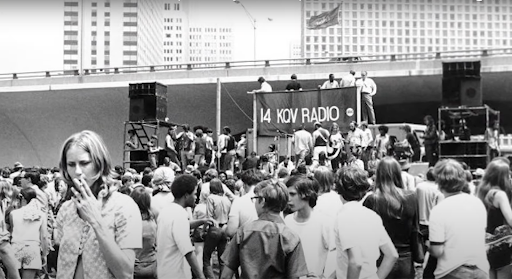Pitt student chronicles Pittsburgh’s musical legacy in documentary ‘The Scene Will Never Die’


A crowd gathers around the stage at a Pittsburgh concert in the 1960s.
Jazz music swells as iconic images of Pittsburgh in the past and present flash across the screen before cutting to the title card — “The Scene Will Never Die” in bold gray typeface over a black background. The new documentary chronicles the history of music in Pittsburgh from 1930 to the modern day.
Chloe Simpson, a Pitt junior majoring in film and media studies and urban studies, produced and directed the film with support from the Frederick Honors College. Through a series of interviews with music scholars, historians and musicians, Simpson covers the rich history of the Pittsburgh music scene.
“The Scene Will Never Die” premiered on Atwood Street in Oakland on Oct. 7 with a concurrent YouTube stream. The premiere showcased a cohesive documentary, but when Simpson initially received the Honors College fellowship that financed this film, it had a different scope than the final product. Simpson said observing the music scene during her time in Pittsburgh led her to change her concept.
“I received the Creative Arts Fellowship through the University to make a documentary that was originally going to be about small businesses and urban change in Pittsburgh, but having observed a small portion of the music scene here in my first two years, I decided I would feel most passionate researching into the Pittsburgh music history,” Simpson said. “Going into it, I knew that there was some history — but I didn’t know the extent to which Pittsburgh held a role in nationwide music.”
She began work on this film at the beginning of summer and wrapped filming in October. Most of the film is interviews with a wide berth of Pittsburgh musical experts. The documentary begins with Johnathan White, a Pitt alumnus and music history professor at Penn State Greater Allegheny.
In “Paradise,” the first part of the documentary, he details his journey in writing his dissertation on Black jazz musicians in Pittsburgh. He said it took time to build up the musicians’ trust, but it was worth it.
“Just listening to them, there was such a strong sense of nostalgia. It was the greatest, you know, this golden era,” White said. “They’re talking about Pittsburgh primarily from the 1940s to the late 1960s. There was a Black musicians’ union, Local 471, that was established in 1908. With this union, in 1941, this musicians’ club became the hub of Black activity, where Black jazz in Pittsburgh exploded.”
As civil unrest in the late 1960s took hold of Pittsburgh and jazz’s popularity waned, this golden era faded into obscurity. In the second part of the documentary, “Smoky City,” Johnny Angel, the owner and curator of the Pittsburgh music museum Johnny Angel’s Ginchy Stuff, explained Pittsburgh’s musical reputation. As a city much smaller than heavyweights like New York City and Los Angeles, Angel said many musicians that are from Pittsburgh are not recognized enough.
“Once they become bigger, you move to New York or you move to LA. A lot of cities looked at us like we were not something big, but we were,” Angel said. “You’ll see some of the names that came out of here, just totally amazing, like Chuck Jackson, Tommy Hunt, The Skyliners, The Vogues, The Marcels and it goes on and on. But people didn’t take us seriously as a steel town, it was a smoky city.”
Despite this reputation, Pittsburgh created a vibrant rock and punk music scene throughout the 1970s, lasting all the way through the 1990s. The epicenter of this alternative scene was the Oakland club “The Decade.” In its third part, “Have a Good Time and Get Out Alive,” the documentary depicts the rise and fall of this prolific venue, located on the corner of Atwood and Sennott in the building that now houses the Garage Door Saloon.
Byron Nash, a musician who moved to Pittsburgh from Baltimore, explained the history of music in Oakland. Nash says that many Pittsburghers today don’t understand how prominent Oakland was in the local music scene.
“Oakland used to be the hot spot — they had all the great venues. We had The Graffiti, we had Laga, we had The Upstage. It was the cultural hub of the city,” Nash said. “I wish people now knew how great Oakland was. That’s where your favorite would be before you knew they were your favorite band.”
In the fourth and final part, “The Sky’s The Limit,” the film concludes with the musicians that occupy Pittsburgh today. Nash said there is an interconnectedness in Pittsburgh that allows musicians to hone their craft. Dr. D, the guitarist for Pittsburgh band Stone Throwers, echoed this statement, saying he wants Pittsburgh’s music scene to continue to evolve.
“There are cities that aren’t that big that do big things for their artist community,” Dr. D said. “There are so many good artists and performers here, that if we build an infrastructure to keep people here, the sky’s the limit.”
These interviews and more make up the 40-minute film. “The Scene Will Never Die” is her first documentary, and Simpson found starting the project daunting. However, she quickly got into the flow of filmmaking. She said following the story wherever it goes is vital to documentary filmmaking.
“From this experience, I’ve learned to go with the flow — to accept that sometimes an interview will lead you in a direction you didn’t expect the film to take, but that is a beautiful thing,” Simpson said. “Real life and real people are never what you would expect, and I feel like it is my role as a documenter to allow the truth to hold its power.”
Recent Posts
Porch roof collapse injures dozens during party on Semple Street
The roof of a porch on Semple Street collapsed during a St. Patrick’s Day celebration…
A Good Hill to Die On // Break It Down
In this release of “A Good Hill to Die On,” I dive deep into the…
Who Asked? // Does growth only “count” if it’s quantifiable?
This installment of Who Asked? by staff writer Brynn Murawski wonders why it feels like…
“They’re throwing trans people under the bus”: Counseling center faces backlash after event name change
On Feb. 24, Pitt’s Counseling Center faced backlash after briefly renaming an event from "LGBT…
Q&A: Meet the 2024-2025 SGB president and vice president
SGB announced the 2024-2025 election results at their meeting on Tuesday. The Pitt News spoke…
Editorial | Pitt Administration must listen to its students’ electoral demands
The passing of these referendums does not guarantee a future Pitt with these policies. Merely,…

